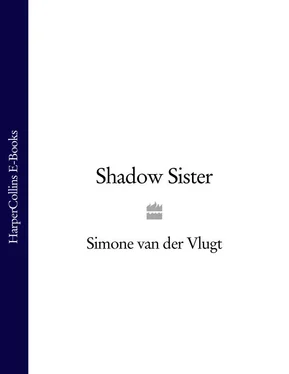‘Thank you, miss,’ Tom says. ‘You’ve got a good heart.’
I smile because he always says that and I suspect he uses the same line on everybody.
‘I mean it,’ he says. ‘There are enough people who spit in my face or try to run me over. It’s dangerous work, lady. Dangerous work for just a few euros.’ Before I can say anything back, he’s walked off, still talking loudly.
Tom is always at the same crossroads. He usually walks along the queue of cars with a bucket and gets a bit of loose change without having to get his sponge out. I find it impossible to drive on and ignore Tom. In fact I can’t ignore anyone.
A while back, the action group ‘Keep Rotterdam Safe’ called on Rotterdammers not to give money to beggars. The morning before that, I’d given Tom ten euros, a bag of currant buns and Raoul’s windproof ski jacket. I can still picture him standing there with them.
‘Now I’m all set!’ he’d said.
The following day he was at the crossroads, wearing the red jacket. I’ve never dared tell Raoul about it – he’s not that keen on beggars and tramps – but he’s never missed the jacket.
‘No one has to live like that in Holland,’ he always says. ‘They could look for a job, and if they don’t want to, I’m sorry, but they shouldn’t hassle people who do work for their money.’
The topic keeps cropping up in our conversations and occasionally causes rows. But it’s also how we met in the first place.
I was twenty-two and still a student. Raoul was twenty-six. I was in my final year of teacher training at college in Rotterdam and travelled in from Berkel & Rodenrijs, where I lived with my parents.
My train was a commuter train, full of passengers who were delighted if they could find a seat and doze unashamedly or open up their morning newspaper. But the majority went through the daily torture of standing, packed together.
It was usually quite quiet when I got on and I’d be fortunate enough to get a window seat, safely out of reach of the pointy elbows in the central aisle. Engrossed in a book or course material, the time passed quickly and I barely noticed my fellow passengers.
One bright spring morning in March I was staring out of the window at the cows in the meadows and the clouds that seemed to rise up out of the mist. A loud shout broke my reverie. It came from the area next to the doors, where a few people were standing. Two young men stood facing each other. One was wearing a tracksuit, he was bald and had a nose ring; the other was dressed in a smart coat and had neatly combed hair – the picture of decency and good sense. But that must have been just show because the bald guy was shouting, ‘What did you say? Mind your own business, you prick!’
Everyone in the carriage was pretending not to have noticed.
The well-dressed man said something back, at which point the bald guy flew at his throat, pushed him against the corridor wall and punched him in the head.
I pushed past the man sitting next to me and rushed towards them.
‘Stop that!’ I threw open the glass doors. ‘Both of you!’
I threw myself between their fists. That stopped them momentarily – the scruffy guy looked at me in amazement, then irritation, and gave me a harmless shove. The well-dressed man seemed to be wondering if I was in my right mind. The scruffy guy tried to push me aside, but I didn’t let him. I grabbed his arm, looked him in the eye and said, ‘Stop! Please! Can’t you just discuss it?’
His expression was so full of fury I was frightened he’d hit me, but at that moment someone behind me said, ‘She’s right. Come on, lads, this isn’t the way.’
I looked around and saw the tall, dark-haired man who’d been sitting opposite me in the carriage. The fight was stopped, the two parties separated with final hateful glances at each other and I returned to my seat.
The man who’d come to my assistance sat back down opposite me. ‘That was brave of you,’ he said, ‘but also a bit foolish.’
‘Everyone pretending not to notice is the obvious solution, isn’t it?’ I snapped back, my cheeks flushed.
‘One of them could easily have had a knife.’
‘Don’t be silly, not everyone walks around with a knife.’
The man looked like he doubted that. ‘It can’t get much worse than it is.’
His words turned out to be prophetic. At the time knife-incidents were on the rise – these days the ticket inspectors won’t get involved in arguments on the trains.
Nowadays every suspect character who comes into Rotterdam is preventatively searched, street shootings have become banal, many secondary schools are equipped with surveillance cameras and metal detectors, and children who witness crimes are shot dead when they’re out playing. The violence is mounting and paralysing us all.
‘Why did you get up then?’ I asked my rescuing knight.
He shrugged. ‘I could hardly have stayed in my seat while a girl was sorting it out, could I? They might have stabbed you.’
‘They might have stabbed each other too.’
‘Yes,’ he agreed, in a way that suggested it wasn’t something he would worry about.
We got out together at Rotterdam Central Station, said goodbye and went our separate ways. Then he came back towards me.
‘I’ll walk with you a while,’ he said. ‘We don’t know where those guys are now.’
He accompanied me to the tram and I began to suspect ulterior motives. But he didn’t ask for my phone number or suggest we meet for a drink. He put me on the tram, the tram moved off and that was that.
At least, for that day. I saw him again the next day, standing on the platform, and happiness swept through me. He came over as soon as he spotted me.
‘Hey,’ he said. ‘It’s me. You know, from yesterday.’
‘Yes, I do remember. Sometimes, if I really try hard, I can even remember things that happened the day before yesterday.’
He laughed and we took the train together. His name was Raoul and he’d just set up his own software company in Rotterdam. From the way he told me all of this, I could tell that he was single.
I was telling him about my course when three scruffy-looking musicians entered our carriage. Two played a brisk off-key tune on the guitar while the other one went around with a smelly cap. Raoul shook his head, but I gave the man some small change. Quite a few people gave me irritated glances.
‘See those dirty looks,’ I muttered to Raoul.
‘Some people find it annoying, they want to read their papers in peace in the mornings,’ Raoul commented. ‘Giving money only encourages begging.’
‘I’d rather they asked for money than pickpocketed my purse,’ I replied.
Raoul grinned. ‘I bet you give a euro to those people who don’t have quite enough cash for their train ticket.’
I blushed and Raoul shook his head pityingly. ‘You’d have been better off training to be a social worker.’
The train came to a standstill. The conductor announced that we’d be delayed for an indeterminate period of time, regretfully. I didn’t find it at all regretful.
As we continued talking, I studied Raoul. Was anything unattractive about him? By the time we pulled into Rotterdam station, I still hadn’t found it.
We went out a couple of times and during the course of one of those evenings, Raoul told me that he never usually took the train to work. The morning we’d met, smoke had poured out of his car engine and he’d had to take the train. A few days later his car had been repaired, but he’d kept taking the train to see me.
He was lodging temporarily with his parents in Berkel & Rodenrijs because he’d been able to get a good price for his house and hadn’t found a new one yet. He wanted to move to Rotterdam to be closer to his work.
Читать дальше












